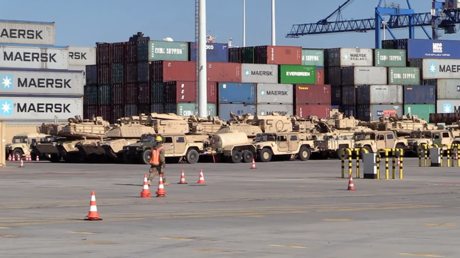Biggest war games kick off in Sweden to practice deterrent skills against Russia (VIDEOS)
Sweden is hosting its largest military games so far this century to prepare for a possible Russian attack. The number of troops involved exceeds by several thousand those participating in the concurrent Russia-Belarus Zapad 2017 drills.
Sweden's Aurora 17 military exercise, the largest in over two decades, involves a total of 19,000 Swedish troops, as well as 1,435 soldiers from the US.
Non-NATO member Sweden will also host personnel from around 40 government agencies from Denmark, Estonia, Finland, France, Lithuania, Norway and the United States, to practice active deterrence against a foreign enemy.
READ MORE: Sweden, NATO allies launch biggest military exercise in 23yrs amid 'Russian threat'
Back on the road again! Idag har F7 med @72_Sqn i spetsen sladdat ner kärrorna på Riksväg 44! Foto: @ TLX Com #svfm#jas39gripen#aurora17pic.twitter.com/ibmuas4BCU
— Stridspiloterna (@stridspiloterna) September 13, 2017
“It is the greatest, the biggest, military exercise we have conducted for 23 years. We are exercising in a context where we are at home protecting our country, where we have the situation occurs when there is a military aggression towards a country,” Swedish Chief of Defense Micael Byden said Wednesday.
Sweden also says that the maneuvers are being held with an eye on Russia.
“Russia is the country that affects security in Europe right now with its actions – the annexation of the Crimea and continued battles in eastern Ukraine. So it is clear that we are watching very closely what Russia is doing,” Byden said.
Moscow reiterated, that Crimea reunited with Russia in 2014 following a referendum, in which over 96 percent of its residents approved the move.
Stockholm emphasizes that the ongoing drills, which will run until September 20, are not NATO exercises, but Swedish national defense maneuvers. Participation of foreign forces troops is welcomed in case of any potential aggression that Sweden might encounter from Russia. The drills conducted in the air, on land, and at sea are concentrated in Gotland, in areas around Stockholm, Mälardalen and Gothenburg.
Minnesota National Guard and #svfm Soldiers of the Cobras 1-194 AR, G Company 134th BSB Skaraborg, Sweden Sept. 13, 2017#Aurora17pic.twitter.com/AAK98cgCif
— Lew Anno1540 (@anno1540) September 13, 2017
“We build our security together with others. We are prepared to give support but also to receive support when needed,” Byden said. “The signal Sweden is sending right now is that we're here, we're prepared to take the responsibility for stability and security in the surroundings.”
“We do it by ourselves but we also do it together with international partners. That's the message we are sending around the world,” Byden stressed.
Not everybody sees the Aurora maneuvers as good for the safety of Swedish citizens.
“Military exercises don’t make us safer,” says anti-militarist and peace activist Pelle Sunvisson. “I don’t think that military can protect us.”
All the support of a NATO presence in the country, Sunvisson believes, is due to the fact that “there’s a lot of money to be made from armament, from getting closer to NATO. There’s a lot of political careers to be done from playing on the threat.”
The drills run parallel to the Russia-Belarus Zapad 2017 exercises which kick start on Thursday.
Apart from 70 aircraft and nearly 700 land vehicles, the exercise will involve up to 12,700 troops, over 6,000 fewer than the personnel involved in Sweden's drills.
Western officials and media outlets, however, continue to state that the drills will have over 100,000 participants. Moscow said that it was “astonished” by those “baseless figures,” and that it had provided “comprehensive information of the concept, defensive nature and true figure of the Russian troops engaged in the Zapad 2017 exercise” in a timely manner, Russian Defense Ministry spokesman Major-General Igor Konashenkov said in a statement earlier in September.
Moscow also reiterated that the deployment of troops for Zapad 2017 would not exceed the limits for mandatory monitoring under the 2011 Vienna document, the OSCE agreement meant to foster confidence through a number of measures to make military forces deployed in Europe more transparent. Russia and Belarus hold major joint military exercises every two years, alternately in each country.
While NATO and its partners are concerned about the exercises, Moscow has repeatedly pointed to the bloc's own increased military activity on Russia's borders. Moscow estimates that around 40,000 NATO troops have and will take part in various military drills in Europe between June and November.
Moscow has also warned that NATO’s military build-up close to its borders, which has intensified since the Ukraine crisis, risks undermining regional security. Yet despite the Russian concerns, EU is considering creating a free movement of troops and military hardware across Europe. The so-called ‘military Schengen’ concept was voiced during the latest EU defense ministers' meeting in Tallinn, Estonia.













